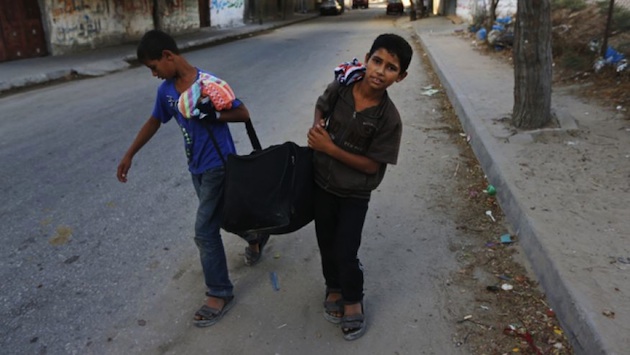

July 16, 2014: Palestinians carry their belongings as they flee their homes in the Zeitoun neighborhood of Gaza City, after Israel had airdropped leaflets warning people to leave the area. (AP Photo/Lefteris Pitarakis)
International pressure is building on the militant group Hamas to reverse its rejection of the Egyptian-proposed cease fire, a decision that has cost them political credibility and in blood. The cease fire would have gone into effect Tuesday morning, but instead Hamas announced its rejection of the proposal only moments after Israel announced that its Security Cabinet had accepted the proposal.
“I cannot condemn strongly enough the actions of Hamas in so brazenly firing rockets in multiple numbers in the face of a goodwill effort to operate a cease-fire,” U.S. Secretary of State John Kerry said Tuesday. Even U.S. allies across the pond, who recognize Palestine as a state, have condemned the decision.
“I hope the Hamas leadership now understand the best thing to do is to call a halt, have the negotiation, discussion, and sit down with everybody to work out a long-term, viable plan for Gaza,” former British Prime Minister and Middle East peace envoy Tony Blair told Sky News.
Still, Egyptian officials said they remain confident a truce deal is possible. President Abdel Fattah Al Sisi planned to host Palestinian President Mahmoud Abbas in Cairo on Wednesday, and Abbas, who formed a coalition government with the militant group to maintain power, has expressed support for the Egyptian proposal.
Meanwhile, Israel’s decision to accept the cease-fire has given Israeli Prime Minister Benjamin Netanyahu and his government the moral high ground, particularly after criticism Tuesday from Deputy Defense Minister Danny Danon showed Netanyahu went against many of his own, more-hawkish advisors by accepting the cease fire.
The prime minister downplayed Danon’s statements that suggested Netanyahu had made a mistake by accepting the deal, while other members of Netanyahu’s government, including Foreign Minister Avigdor Lieberman, support a ground invasion. Lieberman said a press conference that “the Israel Defense Forces must finish this operation in control of the entire Gaza Strip.”
The disagreement played out as news of an Israeli man delivering food to soldiers Tuesday at the border of the Gaza Strip was struck and killed by mortar fire, becoming the first Israeli death since the conflict began. Prime Minister Benjamin Netanyahu vowed to hit Hamas with “great force” for the attacks and rejecting the cease fire.
“Hamas chose to continue fighting and will pay the price for that decision,” he said in a televised address.
The Israeli military warned thousands of Palestinians living in the eastern and northern parts of Gaza to “evacuate immediately” and be out be by 8 a.m. Wednesday local time, or 1 a.m. ET. An Israeli military spokeswoman said residents of Beit Lahiya, which is a town of approximately 70,000 people located in northern Gaza, as well as the Zeitoun and Shijaiyah neighborhoods of Gaza City, had been warned by telephone. The Israeli newspaper Haaretz reported that 100,000 automated calls in total had been made to Gaza residents, but PPD could not confirm that number with the Israeli military.
The warnings were also sent by text message and by leaflets dropped from planes. The messages said that the area was the location of a large numbers of rockets that were already launched into Israel, and that warplanes plan to bomb these locations.
“Whoever disregards these instructions and fails to evacuate immediately, endangers their own lives, as well as those of their families,” the message said.
The latest violence began following the kidnapping and killing of three Israeli teenagers last month. Their bodies had been discovered in a shallow grave in the West Bank. Then, there was a subsequent kidnapping and killing of a Palestinian teenager in an apparent revenge attack. Israel launched an offensive on July 8, saying it was going to put an end to Hamas rocket fire “once and for all” out of Hamas-controlled Gaza Strip.






